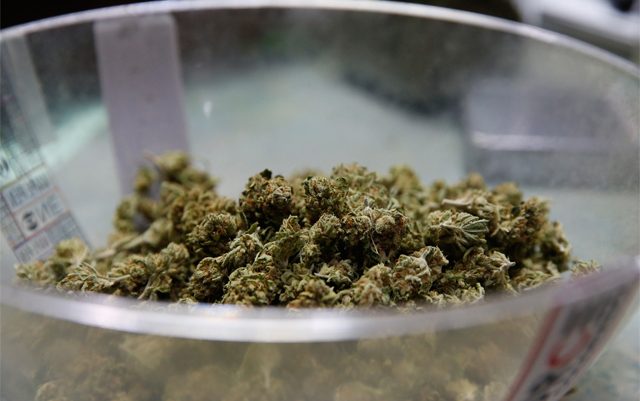It’s a federal decision that could mean a sea change for the cannabis world. The Drug Enforcement Agency (DEA) released a new policy on Thursday morning that will, for the first time, supply quality cannabis to the world of American researchers. The new policy statement from the DEA (in consultation with NIDA and the FDA) outlines a new approach to the availability of medical grade marijuana for science.
It’s a bittersweet victory for growers and researchers that have been forced to spend their time and money abroad to investigate the medical benefits of the plant due to federal restrictions. One such company is Kalytera Therapeutics, Inc., a pharmaceutical company developing a portfolio of proprietary cannabinoid and endocannabinoid-like medicines.
“As a company that already does its research abroad, we’ve always been prepared for tricky hurdles regarding scientific research into cannabis,” said Seth Yakatan, co-founder of Kalytera Therapeutics, in an interview with The Marijuana Times. “As an advocate and operator within the industry, I personally would love to see the rescheduling of the plant for many reasons, but as an individual with sound logic and reasonable expectations, it is partially pleasing to see the DEA take this small, yet significant, step forward.”
Kalytera’s leadership includes pioneers in the field of cannabis research including Dr. Raphael Mechoulam, the discoverer of the endocannabinoid system, and Dr. Yossi Tam, an investigator at Hebrew University.
The change in regulations is the end of the National Institute of Drug Abuse (NIDA) monopoly over bud available for research in America. Prior to Thursday, a single marijuana cultivation center at the University of Mississippi was the sole provider of cannabis to the scientific community.
Topping out at 12.4 percent, the highest THC level that was available to researchers falls way short of the 18 to 35 percent THC available in legal cannabis states like Colorado. In a scientific journal, two researchers from the University of New Mexico wrote about the hurdles they faced before the new policy announcement: “The tetrahydrocannabinoid (THC) potency levels in the cannabis available through NIDA are much lower than those in Cannabis products used by medical patients.” The only two clinical studies funded by the NIH (National Institutes of Health) in 2015 used 3.5 and 7 percent THC, they wrote, it’s not even close to what real-world patients are using today.
In an interview with DEA spokesman Rusty Payne, he told The Marijuana Times “The DEA has never denied a request to research, if the applicants have all their ducks in a row. There must be research protocol. Show us you can secure it and not divert it.” Now, with the opportunity for more growers to get involved in the cultivation process, more researchers may be moved to get their studies federally approved – potentially providing the clinical data needed to revisit rescheduling or descheduling cannabis from a Schedule 1 drug under the Controlled Substances Act. Two requests to deschedule marijuana were denied in a separate announcement Thursday morning.
RELATED: Feds Deny Rescheduling Cannabis, Loosen Restrictions
A notable passage in the new policy gives guidelines for financing the studies. As written in the policy statement, FDA-approved growers may ” grow marijuana not only to supply federally funded or other academic researchers, but also for strictly commercial endeavors funded by the private sector and aimed at drug product development.” It unlocks more opportunities for studies to be funded by entities other than the federal government.
RELATED: Crowdfunding Medical Marijuana Research
It’s yet to be seen if this updated policy will result in more studies, but the hope is that it will help bring more cannabis research to the U.S. and fast-forward the development of science and knowledge surrounding the mysterious herb. One cannabis compound that everyone from Senator Chuck Grassley to the Federal government is interested in is CBD (Cannabidiol).
RELATED: Senator Grassley Testimony Reveals He Is A Proponent of CBD
From the DEA’s policy announcement: “Although the effects of CBD are not yet fully understood by scientists, and research is ongoing in this area, some studies suggest that CBD may have uses in the treatment of seizures and other neurological disorders. A growing number of researchers have expressed interest in conducting research with extracts of marijuana that have a particular percentage of CBD and other cannabinoids. DEA fully supports research in this area. Based on discussions with NIDA and FDA, DEA has concluded that the best way to satisfy the current researcher demand for a variety of strains of marijuana and cannabinoid extracts is to increase the number of federally authorized marijuana growers. To achieve this result, DEA, in consultation with NIDA and FDA, has developed a new approach to allow additional marijuana growers to apply to become registered with DEA, while upholding U.S. treaty obligations and the CSA.”
The monopoly over medical marijuana is over as additional marijuana growers are encouraged to apply to become registered with the DEA to grow the next generation of research grade clinical cannabis. The studies to come could finally create a larger dataset from which the future of cannabis can be determined, while upholding U.S. drug control treaty obligations and the CSA.
Persons interested in applying for a registration to become a bulk manufacturer of marijuana to supply legitimate researchers can find instructions and the application form by going to the DEA Office of Diversion Control website registration page and applicants will need to submit Form 225, according to the policy statement.







i am interested to know more about the CBD how to use and how does it work for depression
can it be used along with other antidepressant eg lexapro and activan.
thank you for quick response.i am really pleased to know about its benefits compare to other anti depressants.